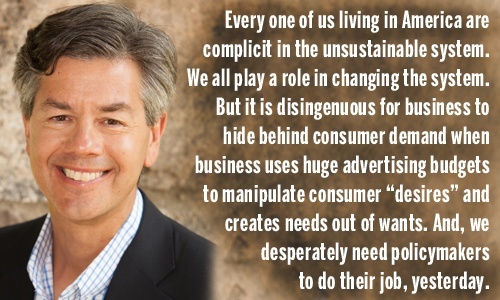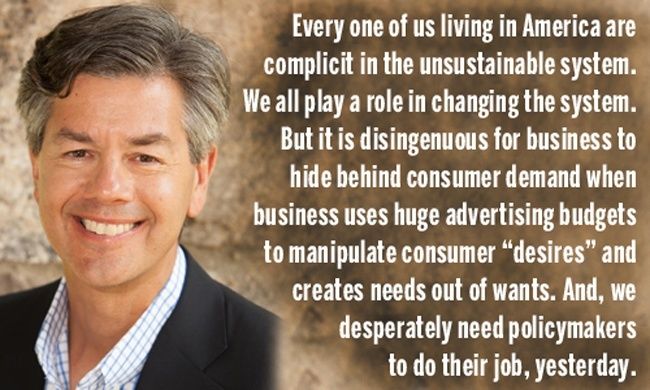
Creating a New Economy That Goes Well Beyond Optimizing Financial Returns for Shareholders



In April, John presented his collaboratively created framework and accompanying white paper at an event hosted by Yale University’s Center for Business and the Environment, which calls on business leaders and policymakers to fundamentally rethink economics and how our free enterprise system operates.
I interviewed John soon after this event and asked him some questions on how we can create a New Economy.
Q. In layman terms, can you describe what you mean by Regenerative Capitalism?
A. Regeneration is the process that sustains health in all systems. Like the cells in our body regenerate every seven years on average, they don’t degenerate more slowly to keep us alive. So Regenerative Capitalism is an economic system that sustains health (is sustainable) because it regenerates its own health—social, ecological and economic—in alignment with the universal principles and patterns that govern all systems in the universe, living and non-living. And of course it requires a broader understanding of “capital” than conventional capitalism. We use the same term because we believe it represents the natural evolution of contemporary capitalism, and to not scare people. But it is quite profoundly different. Some people are now using the phrase “net positive” to get at a similar idea. It’s very different than “less bad.”
In this new video, Reimagining Capitalism, John goes into depth about his alternative framework:
Q. Can you elaborate on what changes you feel are needed for business leaders and policymakers to fundamentally rethink economies and how our free enterprise system operates?
A. The essence of the hypothesis is that we should look to the principles and patterns of all living and non-living systems in the universe as our guide, not what John Fullerton or anyone else “thinks.” It will begin with rethinking how we think, perhaps the hardest part. Ever since the Enlightenment 500 years ago, we have been taught to think in a mechanistic way. We break down complicated problems into parts so we can understand them, solve problems and manage what is complicated. But in the process, we lose sight of the whole and that’s how we get into trouble. We are not capable of managing complex systems like human economies (or marriages for that matter) using mechanistic thinking that is well suited to solving merely complicated problems. Complexity is entirely different.
So for example, we have a belief system that maintains “efficient returns on financial capital” is the logical way to allow a competitive free enterprise system to organize itself and to operate. We even evoke Darwin’s “survival of the fittest.” But this statement is often misconstrued and Darwin of course meant the one that “fits best” (most adapted to the changing environment) when he borrowed that term. So our ultra competitive, and “optimize financial returns rather than harmonize returns on multiple kinds of capital (including social)” thinking has caused manufacturing to leave inner cities. This leads to economic hardship and social problems. If there is too much crime as a result, we arrest more people and build more jails thinking we are solving a problem using this reductionist logic. We fail to connect the dots, we lose our ability to manage the whole. We then experience the kinds of tragic consequences we witnessed in Baltimore last month, failing to grasp their root causes. Optimizing financial returns alone is in conflict with the principles, and, it has consequences.
After we all learn to think and make decisions holistically (with a grasp of the whole—very challenging), business leaders and policymakers alike, then we have a chance. The changes leaders need to make will become obvious, but also profound. They will not be ideologically driven, at least this is my hope. They will contrast the universal principles with how we currently manage businesses and the economy, and then get to work. For example, “robust circulation” is a principle, but “exponential growth” is most certainly not (it’s the ideology of a cancer cell that takes over and kills its host as we have heard and know). So policymakers will draft policies that encourage circulation of materials, information and money at all levels of the economy (local, regional, national, global) as a policy priority ahead of undifferentiated exponential growth (which is the current objective). This translates into circular economy incentives for materials and energy so it is already happening (slowly). But it also informs the structure of the banking system to support credit not getting sucked into the center in too big to fail banks and deployed to extractive (and degenerative) leveraged speculation. Rather, it is incentivized to promote circulation of money in the real economy through a diversity of small, medium and yes, large banks in service of the whole. The list is endless. But to be effective, we need to align with the pattern of all principles acting in an interconnected way, not look at one at a time. And we need to be willing to reject current thinking that is in conflict with the pattern (competition rules, growth is the goal, optimize return on capital at all costs, etc.). We will only muster up the courage to do this when we have a robust theory that we can believe in; a framework that can provide rigorous metrics by which to manage the system. This work is underway and is very exciting.

 233k
233k  41k
41k  Subscribe
Subscribe 